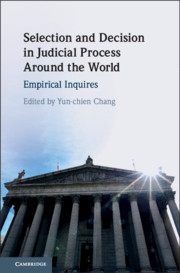Book contents
- Selection and Decision in Judicial Process around the World
- Selection and Decision in Judicial Process around the World
- Copyright page
- Dedication
- Contents
- List of Figures
- List of Tables
- List of Contributors
- Acknowledgments
- Introduction
- 1 Do Patent Law Suits Target Invalid Patents?
- 2 Platform Procedure
- 3 Speedy Adjudication in Hard Cases and Low Settlement Rates in Easy Cases
- 4 How Lower Courts Respond to a Change in a Legal Rule
- 5 Career Judge System and Court Decision Biases
- 6 Judges Avoid Ex Post but Not Ex Ante Inefficiency
- 7 When Winning Is Not Enough
- 8 The Evolution of Case Influence in Modern Consumer Standard Form Contracts
- 9 Judging Insurance Antidiscrimination Law
- 10 Are Judges Harsher with Repeat Offenders?
- 11 Does Efficiency Trump Legality?
- Index
- References
10 - Are Judges Harsher with Repeat Offenders?
Evidence from the European Court of Human Rights
Published online by Cambridge University Press: 04 December 2019
- Selection and Decision in Judicial Process around the World
- Selection and Decision in Judicial Process around the World
- Copyright page
- Dedication
- Contents
- List of Figures
- List of Tables
- List of Contributors
- Acknowledgments
- Introduction
- 1 Do Patent Law Suits Target Invalid Patents?
- 2 Platform Procedure
- 3 Speedy Adjudication in Hard Cases and Low Settlement Rates in Easy Cases
- 4 How Lower Courts Respond to a Change in a Legal Rule
- 5 Career Judge System and Court Decision Biases
- 6 Judges Avoid Ex Post but Not Ex Ante Inefficiency
- 7 When Winning Is Not Enough
- 8 The Evolution of Case Influence in Modern Consumer Standard Form Contracts
- 9 Judging Insurance Antidiscrimination Law
- 10 Are Judges Harsher with Repeat Offenders?
- 11 Does Efficiency Trump Legality?
- Index
- References
Summary
Although in the last decade an increasing number of studies have tried to deepen the understanding of judicial-decision making and generally the working of courts, there is still a substantial theoretical and empirical gap to be investigated. The present research attempts to advance the understanding of judicial decision-making in the rarely investigated field of international courts’. The international setting, representing the intersection of several national politics’ agendas, supplies results even more obscure to be interpreted than national courts.
The main research question raised is whether the usual theoretical pillars guiding damages awarding in judicial decision-making still applies herewith or whether a different approach should be adopted for international courts and specifically for the European Court of Human Rights the subject matter of the current study, in which for example the defendant is very often states rather than individuals. The empirical investigation shows patterns and regularities that might offer a reasonable explanation on how the international court decides and what is the likely meaning of the peculiar damages awarding scheme that seems mainly to go in the direction of performing an expressive function.
Keywords
- Type
- Chapter
- Information
- Selection and Decision in Judicial Process around the WorldEmpirical Inquires, pp. 242 - 260Publisher: Cambridge University PressPrint publication year: 2019

